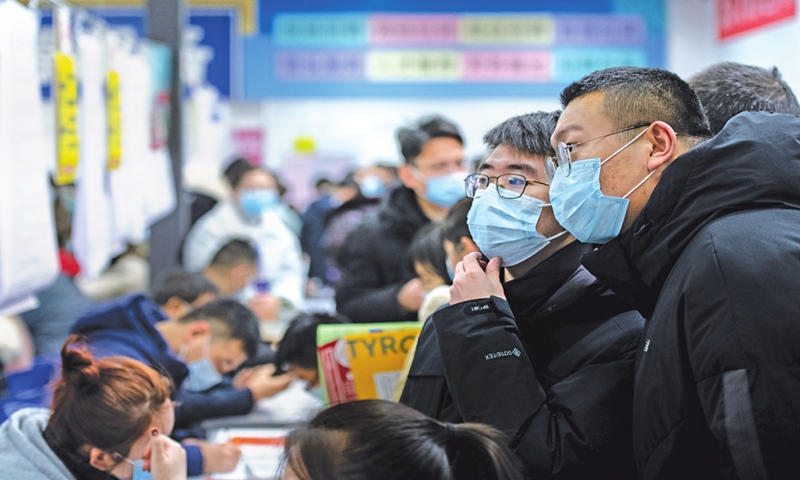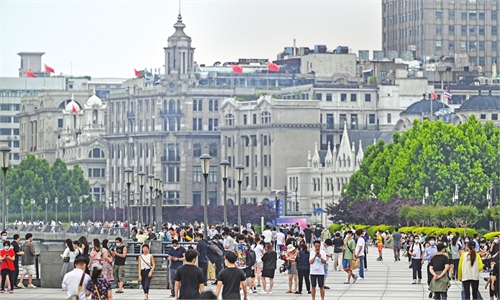Major cities 'battle for talent,' rolling out incentives amid hardest graduate season

Two college graduates read a job description at a recruitment fair held in Taiyuan, North China's Shanxi Province on February 8, 2022. Photo:cnsphoto
As new graduates face the hardest season for job-hunting this year, major Chinese cities including Shanghai, Wuhan and Fuzhou are in a heated "battle for talent," introducing tempting incentives such as immediate household registration and even free housing in a bid to attract more elites into their talent pools.
The support policies have come just in time to ease the anxieties that millions of graduates face, experts said, while also urging a more thorough implementation of the policies to better cultivate, rather than simply introduce, fresh talent so as to truly sustain high-quality development.
In a notice on special support initiatives to help the resumption of work in Shanghai, it proposed to increase the introduction of students from world-renowned universities, the China News reported on Wednesday.
As long as they meet the basic conditions for household registration, or hukou, students who graduated from the top 50 universities worldwide can apply directly for registration in Shanghai if they are working full-time.
For those who graduated from the world's top 51-100 universities, they can apply for hukou after paying premiums for social insurance in Shanghai for six consecutive months. Normally, the procedure of household registration would take years.
It was another relaxation of the hukou system for talent in Shanghai after six regions in the city held trials last year to adopt similar policies for postgraduates.
The reason why such a megacity as Shanghai still wants to introduce new people is that what the city needs is not simply "labor" but "talent." Elites are always needed in any first-tier city, as they are often in short supply, Xiong Bingqi, a deputy director of the Shanghai-based 21st Century Education Research Institute, told the Global Times on Thursday.
As a megacity with a quickly aging population, a constant supply of talent is necessary for Shanghai to maintain sustained economic development and consolidate its position as an international economic, financial, trade and shipping center. Attracting talent that matches these development needs is crucial for the city to enhance its competitiveness, said Feng Wenmeng, research director of the China Development Research Foundation.
The city of Wuhan, Central China's Hubei Province, with a permanent population of 13.6 million, announced on June 7 that graduate students from elite universities can register their household first and then seek a job, and their family members are allowed to settle in the city as well.
Fuzhou, capital city of East China's Fujian Province, offers job-seekers who graduated from top universities within three years free housing, and it has extended the period of stay for job-seeking internships from three months to a year, the Fuzhou Daily reported on Thursday.
More than 2,400 beds have been arranged for these job-seekers in Fuzhou, the report said.
Since 2017, Chinese cities have competed for talent with new first-tier cities such as Chengdu, Chongqing and Hangzhou, the main forces in the race.
Data from one of China's major online recruitment platforms Liepin showed that in the past five years, high-end talent migration to first-tier cities was on a downward trend, from 45 percent in 2017 to 37 percent in 2021.
Meanwhile, the proportion of talent delivered to new first-tier cities rose from 31 percent to 35 percent in 2021, nearly equal to that in traditional first-tier cities, according to a report Liepin sent to the Global Times. This showed that the attractiveness of new first-tier cities has continued to increase.
China has entered the stage of high-quality development, and the driving force of that is increasingly focused on innovation, which requires a large number of experts and professionals, experts noted, eyeing such "fierce competition" among major cities as the new normal in the future, which would prompt more comprehensive and effective incentives to be released.
Cultivating such workers is even more important than simply introducing them to cities, as it can fundamentally solve the problem of talent shortages. More attention should be paid to the use and management of such people, Xiong said.
Unhealthy competition for talent has been a problem for China in previous years, Xiong said, even affecting the allocation of funds. Reforms must be carried out to establish a scientific resource allocation and talent evaluation system to provide a good institutional environment for talent development.
The support policies have come just in time to ease the anxieties that graduates face in the hardest job-hunting season, hit by the COVID-19 epidemic and structural contradictions in the labor market, experts said.
An unprecedented 10.76 million graduates are expected to seek work this year in the face of multiple pressures, statistics showed. Job-hunting is, for many, the hardest nut to crack, which is even more difficult than in 2020 at the early stage of the pandemic, China's Ministry of Education said recently.
Changes of recruitment needs in recent years have emerged along with changes in the domestic and international market environment.
From 2019 to 2021, artificial intelligence, manufacturing, big data, energy and environmental protection, and the healthcare industries needed more staff. The two careers that fresh graduates seek the most are health managers and internet celebrities, boosted by an increasingly regulated and flourishing e-business environment, experts said.


